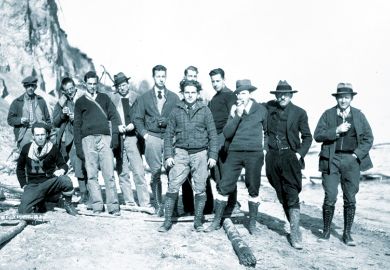We challenge the claim made by Danny Dorling, Halford Mackinder professor of geography at the University of Oxford, that geography is a “soft option” for “posh” students.
Such a statement misrepresents and undermines the knowledge, skills, hard work and achievement of past and present geography students whose expertise addresses climate change, poverty and other pressing issues in the world today. The depth of knowledge and range of intellectual and practical skills acquired during a geography degree equip our students to change the world for the better.
The assertion that geography is a “soft option” for ill-prepared “posh” students appears to be entirely anecdotal. It is neither substantiated by the Ucas tariff points required to study geography at university nor by our knowledge and experience as geographers teaching in higher education. University geography attracts some of the very brightest students in the UK.
As with other subjects, there are considerable variations in the diversity of our students between universities and across the regions of the UK. University geography departments, the Royal Geographical Society (with IBG), the Geographical Association and others are working closely with schools to recruit a wide range of students and to support them with their choice of subject, from GCSE through to their higher education, and into the workplace.
There are positive signs of change within the next generation of geographers: the number of 16-year-olds studying geography GCSE has increased significantly over the last decade. Now 40 per cent of 16-year-olds study geography (265,000 entries in 2019), compared with 27 per cent in 2010.
This increase in entries has come predominantly from groups who have previously been less likely to take geography. It is also set against the positive backdrop of almost equal uptake of geography at GCSE and A level by female and male students, which many other subjects struggle to match.
Results from recent research commissioned by the RGS-IBG are encouraging: the proportion of disadvantaged students studying GCSE geography has doubled since 2010. Moreover, the rate of growth in entries of black, Asian and minority ethnic students proportionately outperforms that of their white peers. BAME and disadvantaged students have also seen the highest rates of rising attainment at GCSE.
Within universities, work is continuing to recruit a wide range of students with the ability and potential to study geography; to tackle any gaps in the retention or attainment of students; and to address equality, diversity and inclusion for students and staff.
We recognise the importance of work that seeks to “decolonise” geography through the critical interrogation of the subject’s colonial past, the content, scope and methods of geographical teaching and research today, and the wider workplace culture of university geography departments.
Geography graduates are highly employable in the commercial world. Equally their geographical knowledge and skills take them on to a wide range of careers in public policy and practice and in the third sector. Today, geographers can be found working in international development, on decarbonising the economy, on environmental sustainability and addressing inequalities on all scales.
Wherever they work, their geographical training adds value. Geographers are employable because they are trained to apply methods and understanding across the sciences, social sciences and humanities to address global and local problems. Employers recognise that geography requires a flexibility of mind, a depth of knowledge and a breadth of skills that make it far from a “soft option”.
While there is certainly further work to do, highly employable geography students come from a wide range of backgrounds. In an interconnected and interdependent world, geographical training is more relevant and important than ever. We urge anyone currently considering choosing geography at GCSE, A level or university not to be discouraged by a tired caricature of the discipline that doesn’t reflect geography as it is today: vital, increasingly diverse and addressing the challenges facing the modern world.
Alison Blunt is vice president research and higher education at the Royal Geographical Society (with IBG), and a professor of geography at Queen Mary University of London. Martin Evans is chair of the Council of Heads of Geography and a professor of geomorphology at the University of Manchester. This piece is also signed by 89 other geography academics including 59 heads of university geography departments.
Register to continue
Why register?
- Registration is free and only takes a moment
- Once registered, you can read 3 articles a month
- Sign up for our newsletter
Subscribe
Or subscribe for unlimited access to:
- Unlimited access to news, views, insights & reviews
- Digital editions
- Digital access to THE’s university and college rankings analysis
Already registered or a current subscriber? Login



